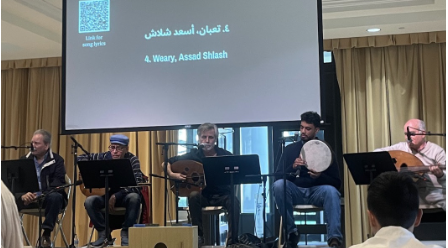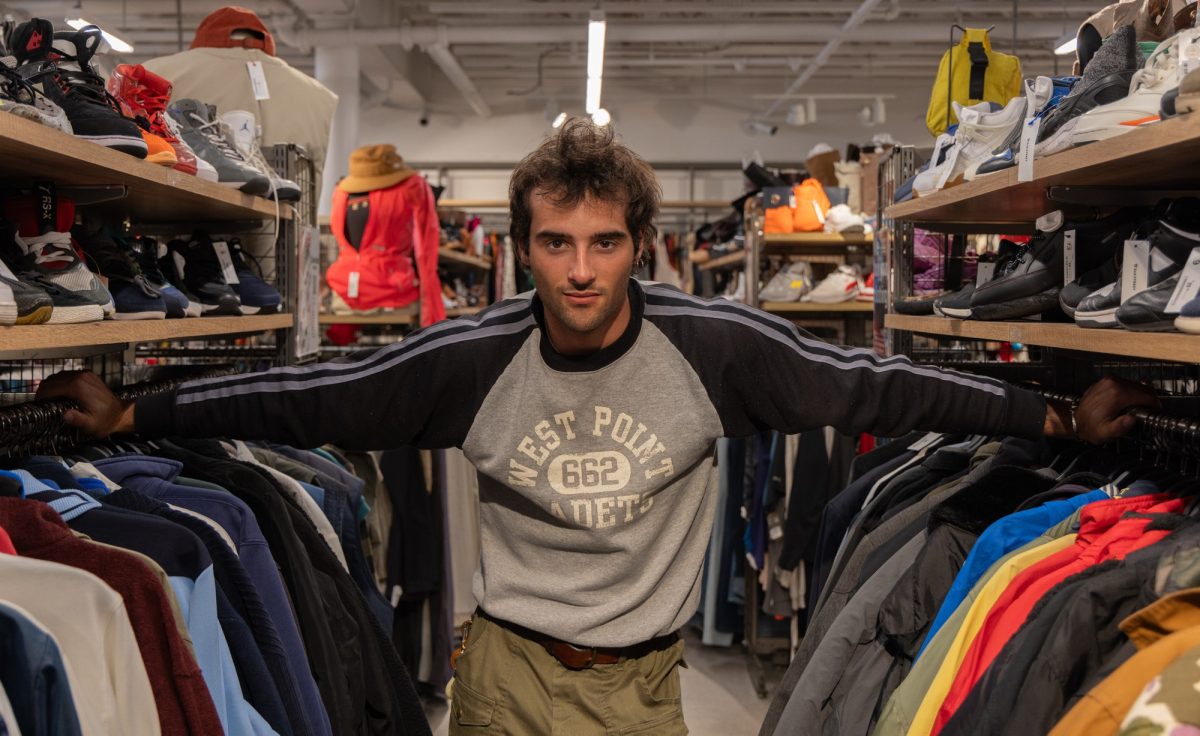A powerful testament to resilience and survival came to Davidson College this March, as a group of former Syrian political prisoners-turned-musicians took center stage. From March 16 to 21, four of these musicians—survivors of Syria’s infamous Sednaya Prison—shared their harrowing yet inspiring journey through an art exhibition and live concert, shedding light on the hidden cultural resistance forged in one of the world’s most brutal detention centers.
The event was spearheaded by Assistant Professor of Arab Studies Dr. Eylaf Bader Eddin, who has dedicated years to researching the music created in Syrian prisons. “This is more than a musical performance, it’s an act of remembrance, resistance and recognition of voices that were meant to be silenced. We gather here to witness humanity and the untold realities of one of the darkest realities of our time,” he commented.
Sednaya Prison, described by Amnesty International as a ‘Human Slaughterhouse,’ is notorious for its systematic torture and inhumane conditions. Prisoners there, many held without trial, resorted to artistic expression to endure the horrors around them. Among these was a group of musicians who, against all odds, crafted makeshift instruments from whatever materials they could find—food scraps, clothing threads and even parts of their own cells.
Bader Eddin’s ARB 336: Arab Life and Politics Through Film course was invited to help recreate some of the instruments these prisoners crafted while incarcerated. “This project significantly expanded my knowledge of Syrian history, culture and the intersection of art and politics. It also gave me a hands-on understanding of how music and art can act as forms of resistance, even in the most oppressive environments,” Emma McDonnell ‘27, a student in the class explained. “Individual voices and artistic pursuits often get lost in the broader narratives of historical atrocities. Still, by sharing their music and stories with us, these musicians ensured people remember.”
Bader Eddin commented on the bravery of these prisoners. “Even from the depth of this brutality, music emerged against all odds. Prisoners found ways to compose, to sing, to count out fleeting moments of humanity. These songs were not just melodies, they were weapons of the fearless and instruments of resilience for those who refused to be broken,” Eddin said.
The highlight of the week was a live concert, featuring performances by four former Syrian prisoners: Faraj Bayrakdar, Asaad Shlash, Hassan Abd Rahman, and Haitham al-Katreb, all of whom were imprisoned for being part of the communist party. The four musicians were joined by two Davidson students, Idil Ira ‘26 and Majeed Abugideiri ‘25. The event was interpreted by Bader Eddin and Nadya Fransis.
“O Mother,” one of the 10 songs on the setlist, was written by Bayrakdar in 1987 for his mother while he was in prison. “Unfortunately, I was in solitary confinement for 6 years and was unable to see her. After those six years, I was finally able to give her this song,” he explained.
Another performed song, “Weary,” was written by Shlash, a music professor in Syria, for a fellow prisoner with cancer who died a few months after he was liberated because he was terminally ill. “I put the music to this song and the lyrics for our friend.”
Bayrakdar reflected on his time in prison and the life he has built since. “The worst phase of my life could be that I spent fourteen years as a political detainee in a Syrian prison. As for the best phase of my life, it could be that I published fourteen books. No doubt that our presence here today is the biggest feeling of freedom.”
Music played a crucial role in preserving their spirits. Hassan Abd Rahman, who spent eight years in Sednaya Prison, recounted how he refined his skills while incarcerated. “Before being detained in the Syrian prisons, I had certain knowledge about music, and I was so lucky that in prison I met my professor [Asaad Shlash] who taught me more and more. I grew my knowledge of music inside the prison. It’s now been 25 years that I’ve lived in France.”
Shlash described the ingenuity required to keep music alive in a place where instruments were forbidden. “In order to keep it for later, we had to make the neck and body of the instruments detachable.”
He recounted how they built their first instrument after three months of detention using materials such as nylon from socks. “I used to play this particular instrument for months in the toilet under the sink for the other prisoners because the cell where I was being detained was too small. In the morning, I used to get up and sit outside the toilet and play some beautiful songs for my friends.”
This event brought these men together with the students who recreated their experiences, reconstructing the makeshift instruments they once played in prison. “It was very touching for me to see this young generation of brilliant students of Davidson College participating in and engaging in this project, and remaking all of our memories and instruments like we did in Sednaya,” al-Katreb shared. “I’m impressed by the atmosphere I’ve witnessed in the past three days at Davidson.”
The music these men played in prison was not just entertainment: it was an act of defiance, a means of survival and a source of hope. As Shlash put it, “I take advantage of this event to express appreciation for life lived out of prison with the help of music.”
This story was originally published on Davidsonian on March 27, 2025.







































